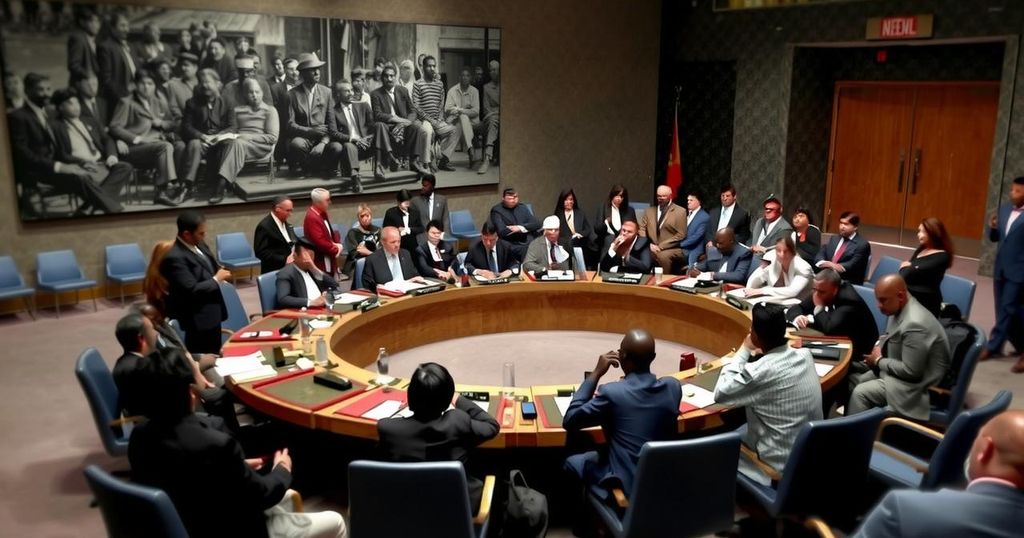Global news
ABYEI, AFRICA, AGUAK, AMAN, AMAN -, CIVIL WAR, HUMANITARIAN, HUMANITARIAN CRISIS, MARTHA POBEE, MAYARDIT, MIJAK, NGOK DINKA, NOONG, POBEE, RAPID SUPPORT FORCES, REFUGEE CRISIS, REFUGEES, RSF, SOUTH SUDAN, SUDAN, UN, UN DEPARTMENT OF PEACE OPERATIONS, UN INTERIM SECURITY FORCE FOR ABYEI, VI, VIBHU MISHRA, WARRAP
Jamal Walker
0 Comments
Impact of Sudan War on Regional Stability in Abyei
The war in Sudan is causing severe regional consequences, particularly in Abyei, a contested area between Sudan and South Sudan. This includes a growing refugee crisis, resource scarcity, and heightened tensions among local communities. The UN highlights the need for enhanced peacekeeping efforts, including the deployment of police forces, as humanitarian conditions worsen.
The ongoing conflict in Sudan continues to have severe ramifications beyond its borders, particularly affecting the disputed autonomous region of Abyei, which lies on the border of Sudan and South Sudan. The war, which erupted last April between competing military factions, has manifested significant challenges, including a deepening refugee crisis and disruptions in oil production, which is vital to both nations’ economies. Martha Pobee, Assistant Secretary-General for Africa at the United Nations Department of Peace Operations, emphasized the deteriorating humanitarian and security situations faced by both countries involved. In the wake of the conflict, Abyei has seen an uptick in refugee numbers, exacerbating resource scarcity in South Sudan, where thousands of refugees are struggling with a lack of essential services such as clean water, food, and healthcare. The proliferation of arms in the area has further destabilized the region, with recent incursions reported by the Rapid Support Forces, which have led to looting and heightened tensions, particularly between the Twic Mayardit and Ngok Dinka communities. Natural disasters have compounded these issues; heavy rainfall displaced over 18,000 individuals in Abyei alone, damaging homes and infrastructure while posing public health risks. Despite these challenges, the UN Interim Security Force for Abyei (UNISFA) has been working towards establishing intercommunal dialogue and conflict resolution measures. Efforts have included facilitating migration conferences aimed at fostering peace among different community groups. Relations remain strained, particularly due to the continued presence of South Sudanese security personnel in Abyei, violating longstanding agreements. Meanwhile, UNISFA endeavors to deliver humanitarian assistance, ensuring that critical services reach those in need, which is essential for fostering long-term stability in the region. However, discussions between Sudan and South Sudan concerning Abyei’s status remain halted, with important oversight committees failing to meet since January 2023. To enhance security, Ms. Pobee has called for the full deployment of UN police forces to support stability efforts amid increasing demands for assistance.
The article discusses the escalating impact of the ongoing conflict in Sudan on the border region of Abyei, which is contested by both Sudan and South Sudan. Following a severe power struggle that began in April 2023, the situation has worsened with a growing refugee crisis and a significant disruption to oil production in the region. The United Nations officials, including Martha Pobee, have raised concerns about the humanitarian conditions, security challenges, and the proliferation of arms that have emerged as consequences of the conflict, further complicating an already fragile environment.
In summary, the conflict in Sudan continues to reverberate across borders, particularly affecting Abyei and leading to increased instability, resource scarcity, and humanitarian crises. The ongoing violence, displacement of populations, and proliferation of arms create formidable challenges for peacekeeping and long-term stability. Effective international engagement and assistance, particularly through UNISFA, are crucial in addressing these complex issues and fostering dialogue to resolve the underlying tensions between Sudan and South Sudan.
Original Source: news.un.org




Post Comment